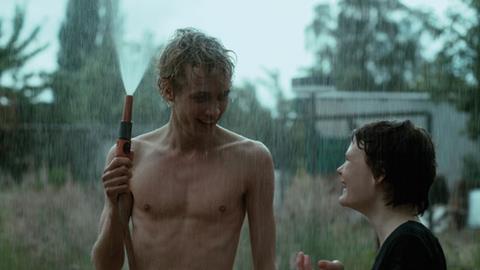Dir/scr: Katrin Gebbe. Germany. 2013. 110mins

Press screenings can be savage affairs, but it’s rare that a film is booed at the end of its official Cannes Festival screening. One could argue that the boos that greeted the closing credits of Tore Tantz – followed, to be fair, by an equal and opposite ripple of applause – are credit to the shock value of this depressing tale of abuse and torture, which is leavened only by the faintest glimmer of hope.
So determined is the director to rub our faces in the graphic details of the abuse suffered by Tore that she loses her grip on character.
For in one way this increasingly ugly tale of a Christian drifter who falls into the hands of a bullying pater familias is an impressive debut: both Gebbe’s direction and the performances she coaxes out of her cast demonstrate a sure control of limited means. But the sheer nastiness of the film’s descent into the dark side will be difficult for many to take; by comparison, Funny Games looks like a teddy bear’s picnic.
Whether audiences contain their revulsion of this horror-infected drama will depend largely on how much they buy into the film’s religious subtext, which has to do with the martyrdom of an unlikely, punkified modern-day saint, and the extent to which martyrs write the script of their own persecution. Tore Tanzt’s power to disturb is, paradoxically, its theatrical and auxiliary calling card, and proof that niche distributors may be willing to take a gamble on it came on the morning of the film’s lively press screening, when North American rights to the film were nabbed by Drafthouse Distribution.
Filmed throughout via fluid handheld shots and divided into three cheaply sardonic Seidl-like chapters called ‘Faith’ ‘Love’ and ‘Hope’, Tore Tanzt (‘Tore dances’) focuses on Tore (Feldmeier), a lanky, mop-haired blond innocent and epilepsy sufferer who hangs out in Hamburg with the members of an anarcho-punk Christian commune called the Jesus Freaks. During a roadside encounter, Tore lays hands on the bonnet of a car that won’t start belonging to family man Benno (Gersak) – and the engine promptly springs into action.
This is the beginning of Tore’s connection with the outwardly friendly Benno and his family, and soon he’s spending more time in their summer allotment house than with the loose-knit Freaks. Gangly, gawky and grinning, insulated by his faith, Tore seems to bring out the worst in Benno – though it soon becomes clear, from the bruises on the arms of the latter’s tomboy teen stepdaughter Sanny (Kohlhof) that Benno was pretty bad to start with.
With Benno’s wife Astrid (Kuhl) doing little to defend the newcomer, and eventually pitching in herself, Tore endures a crescendo of abuse that will see him variously beaten black and blue, starved then forced to eat maggot-infested meat when he steals from the rubbish, and pimped out to sadistic clients at a gay club.
Why Tore keeps coming back for more is a mystery the film never quite resolves: is it that for Tore, who seems to have grown up in children’s homes, even an abusive family is better than none? Is it his growing bond with Astrid, perhaps the only ray of light in the film’s dark night of the soul? Or is it a thirst for martyrdom? Like Breaking The Waves, Tore Tanzt doses out the religious hints and references sparingly in order to preserve the shock of realism, but there’s no mistaking writer-director Gebbe’s hints that Tore is a child-of-nature saint figure engaged in a battle with the forces of darkness.
This would be more palatable if one didn’t feel that some of Benno’s sadism had rubbed off on the film itself. So determined is the director to rub our faces in the graphic details of the abuse suffered by Tore that she loses her grip on character. We baulk when Astrid joins in with Benno’s cruel game; but when a next-door neighbour comes over all glassy-eyed and joins in with the torture fun, it stretches our credibility to breaking point.
Production companies: Junafilm, ZDF
International sales: Celluloid Dreams, www.celluloid-dreams.com
Producer: Verena Grafe-Hoft
Cinematography: Moritz Schultheiss
Editor: Heike Gnida
Production designer: Iris Trescher
Music: Peter Folk, Johannes Lehniger
Main cast: Julius Feldmeier, Sascha Alexander Gersak, Annika Kuhl, Swantje Kohlhof, Til Niklas Theinert, Daniel Michel, Leonie Schulz




















